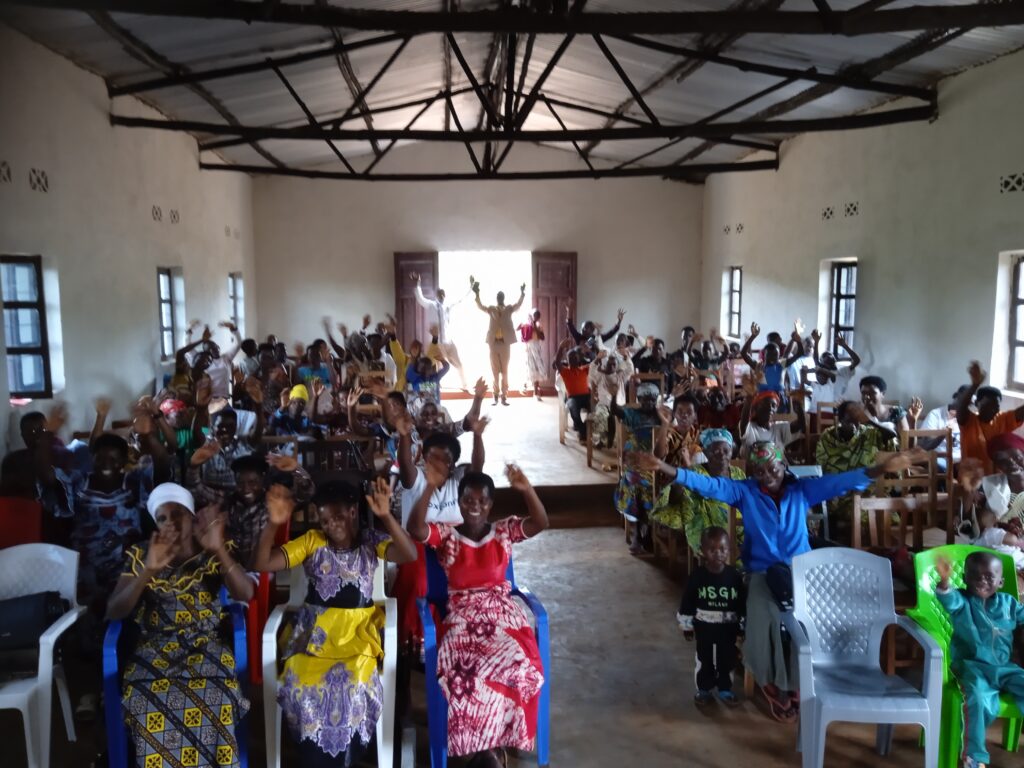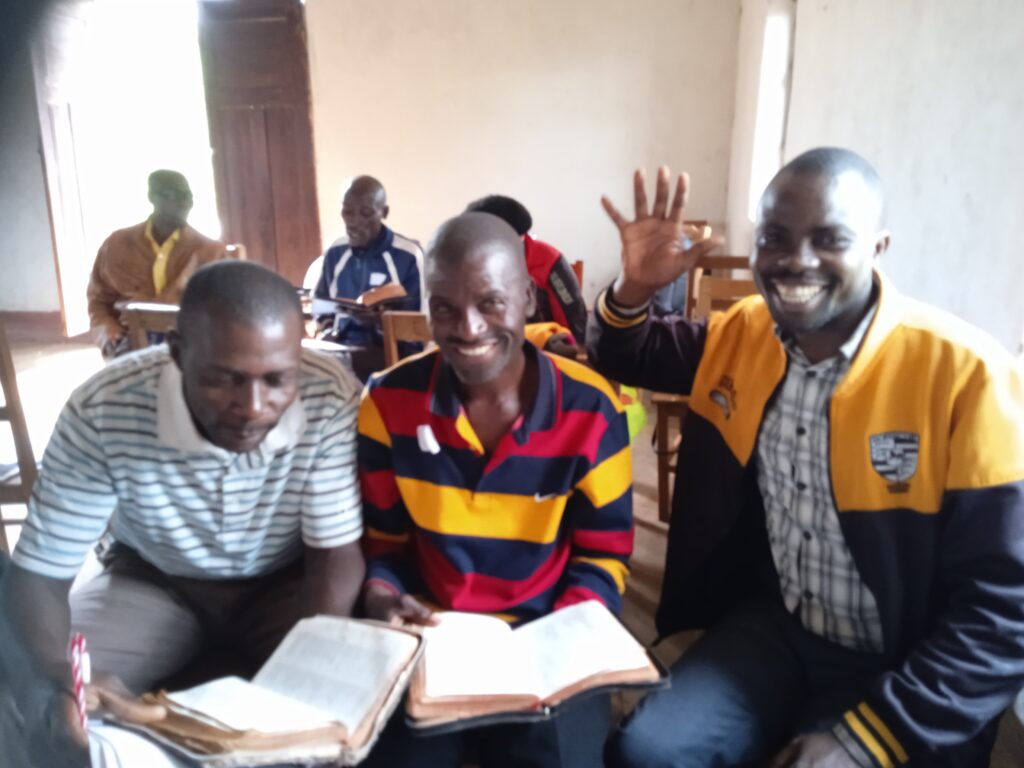Comfort International Director Callum Henderson is just back from two weeks teaching, preaching and visiting projects in two of our partner countries – Burundi and Uganda. Here he shares with us the details of the CIMS (Pastors training) programme as well as the intimate details of life in Uganda and Burundi and the ups and downs of life as a CIMS teacher!
Monday 6th May
It’s Dieudonné’s last day with us and we are flying to Africa on different planes at different times but decide the best way to go about things is to travel through to Edinburgh together. There are no hiccups with my flight, and I fly away oblivious to an emerging problem I’m leaving behind. Dieudonné’s flight stops at Zurich before hopping back to Brussels and then to Kigali for the bus back home to DRC. With the visa being quite late, flights were hard to find, and it was the best we could get, but we’ve missed the Schengen rule that two stops in the EU requires a transit visa. Izzy (my wife) and the team in Scotland work the problem and he finally gets a new flight with one stop but it takes a lot of work and Izzy’s head has gone pop with the long covid.
I’ve nine hours in Doha so I find a quiet corner and do some prep for the teaching. I exchange a few messages with David Gasana (in-country director of Comfort Rwanda). Since we bought my flight the repetitive spat between Burundi and Rwanda has flared up and Burundi has shut its land border with Rwanda. The direct route which is a 4-5 hour journey is now closed and I will need to go via Tanzania. By the time I arrive in Kigali the buses to the border will have left. So it looks like the only way to get down to Burundi in time for a Wednesday morning start is private hire. It’s expensive but with time at a premium I gulp and swallow the expense. I hate seeing funds slip away on things like that but can’t see a way round it. I get a few hours kip on some carpeted floor at Doha before eating some oatcakes and cheese for breakfast and boarding the flight to Kigali.
Tuesday 7th May
My hopes of reaching Burundi by close of play tonight have taken a dent as the flight is an hour late arriving in Rwanda. Chantal and Siella from Comfort Rwanda meet me at the airport as David is busy working with Chris Hoskins who had travelled to Rwanda a couple of days before. Chris is our Creative Manager and a first-class photographer. He is in Rwanda and DRC to get a bank of pictures, stories and videos for the coming year and it’s best for David to spend the time with him rather than come to the airport. I leave at once for Burundi but the journey is fairly slow. As well as the speed traps, the car owner has a brother who does the first bit of driving and he has a disconcerting habit of putting the brakes on intermittently as he is overtaking. The threat of a bus or lorry coming at us in the other direction exacerbates this tendency and I am grateful for an oncoming bus driver who has the foresight to pull off onto the verge and stop whilst we kangaroo past a lorry.
At the Tanzanian border our first stop is for a yellow fever certificate check and a Covid temperature check. I pass both, get asked for “Fanta money” from the Tanzanian temperature checker, smile and decline, and get a wee slip of paper asserting the fact of our covid clearance. Except that when we make our way through Rwanda emigration and get to Tanzania immigration it appears the slip issuer got his months mixed up and our Covid clearance is a month old.
I’m hanging around waiting for the driver to get through passport control when I see a familiar face. It’s Gerard Rukerandanga, our partner for CIMS Burundi. I’d messaged to say I’d meet him in Ngozi (Burundi) but he could never live with himself if anything happened to me on the way and so, unbeknown to myself, he has travelled five or six hours to meet me at the Rwanda – Tanzania border. In the melee of people at the border and the likelihood of us passing each other going in opposite directions on the road, I am so glad we stumbled on each other at passport control here as I have no Tanzanian sim card and no internet to make contact. God is good.
Meanwhile the Covid date issue doesn’t appear to be too much of a problem and after greetings and a catch-up Gerard and I leave passport control and walk past the stacks of articulated lorries to the exit to find our driver has gone walkabouts. We re-find each other 20 minutes later – he had gone back for a change to the date without letting us know. By now the Tanzania – Burundi border is unachievable today. The car owner has taken over and we drive through Tanzania in the dark. The car lights appear not to have eaten their porridge and so the driver finds some map app on his phone, sets it up for our road, holds it above the steering wheel and steers by the thin blue line on the app. It certainly keeps me awake, but the traffic is not heavy and we stay surprisingly faithful to the prescribed route. Must try it sometime.
Around half an hour from the now closed Burundi border we look for a bed for the night. The other brother left us in Rwanda so there are three rooms needed – myself, the driver, and Gerard. There’s a guest house with rooms at 40,000 Burundi francs a night which is £11 but we are only needing a bed to sleep a few hours and I am desperate to cut expenses as hard as possible to recoup some of the unexpected cost of the car. I encourage Gerard to look for somewhere cheaper. We find rooms at 10,000 each and the driver promises we’ll be at Ngozi by 8.30 the next day.
Wednesday 8th May
We are back on the road again around 6am, but the border when we reach it is not yet open and we hang around waiting. There are money changers around and the rate is good so I change some Rwandan francs into Burundi francs. No harm done except an hour’s delay and we set off again, arriving in Ngozi around 10.45, slightly past our 8.30 promised arrival. It’s the first day of a CIMS week and with students travelling long distances an 11/11.30am starting time is not a disaster. It’s been almost a 48-hour journey from home in Carnoustie but I’ve arrived in time to have at least a stab at getting through the two modules I’ve come to teach.
The Burundi class is not large – around 35 students, mainly pastors, but they are eager to learn. I am teaching ‘Preaching and Teaching’ for the first time – our ex-chair David McAdam had taught it first in Rwanda and Phil Arbon has done it in Rwanda & Uganda since then. The challenge in a largely oral culture is two-fold – getting the students into the habit of reading enough around the passage to be faithful to the context and getting them to read the text closely enough to see clearly what it says and doesn’t say. I break the teaching with practical questions on bible passages. Inevitably I get answers based on prior knowledge of general biblical familiarity and keep directing the students back to a close reading of the text. We’ll get to the issue of the actual preaching at some point but faithfulness to biblical meaning is my primary aim.
The teaching has another challenge in that power has been down for a couple of days in Ngozi and there are no notes printed yet. We stop for lunch and the CIMS students’ fine art of food stacking sees some impressive displays of rice, beans and sweet potato mountains on their plates. By the end of the day I feel we have made some progress and the students are positive about what has been taught.
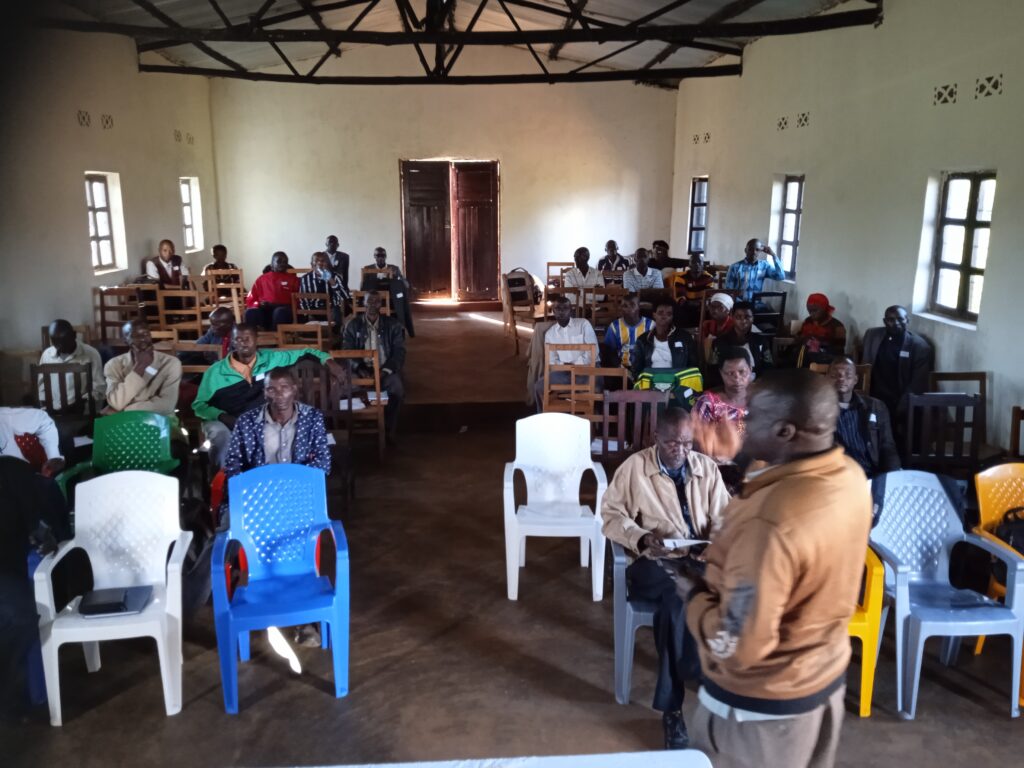
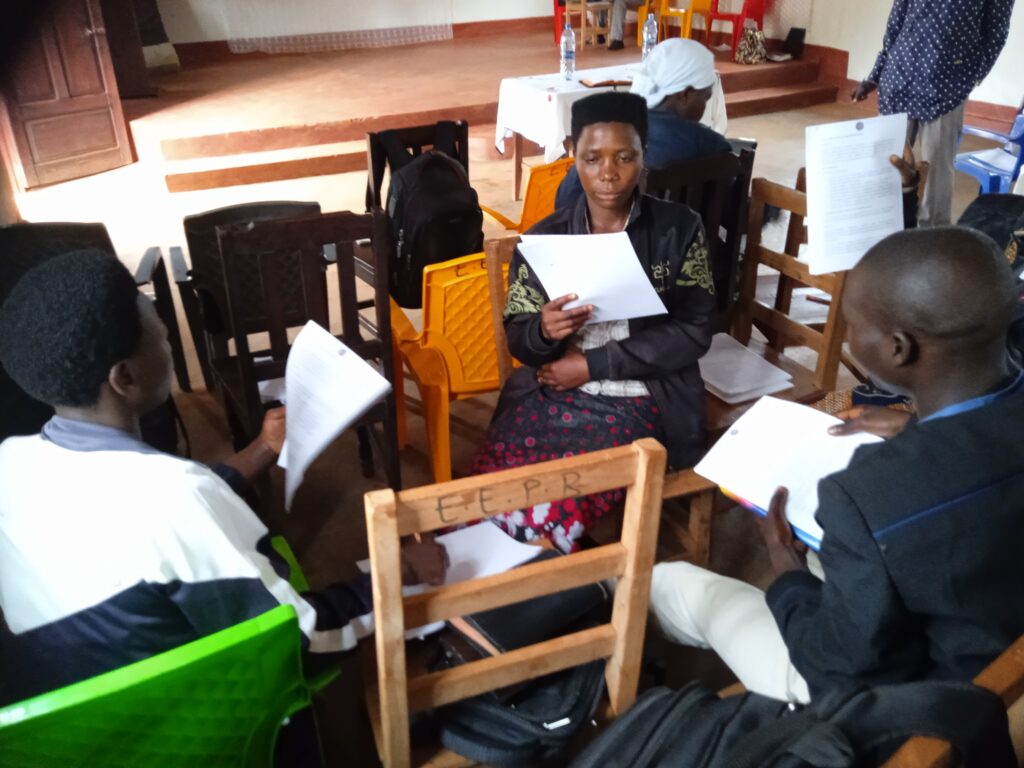
Thursday 8th May
We get started in better time and the power has been on so some of the notes might now be available. But when Gerard went to the printing shop the printer was now broken. Someone is on their way from Gitega, 80 kms away to mend it. Burundi has two capitals – Gitega the political one and Bujumbura the economic one. At present the heavy flooding throughout much of East Africa has made the waters of Lake Tanganyika rise above the lake shores and much of Bujumbura is now badly flooded. Burundi is not in a good way at present and power, internet, water, fuel and sugar are all at different stages of dearth or absence. On the Tanzania side of the border we saw groups of motorcyclists at petrol stations filling as many 2-litre plastic bottles as they could stuff into sacks and rucksacks and boxes with petrol and going back over to Burundi to sell. At present there is no fuel in Ngozi.
The students are working well and despite problems with notes we get onto homiletics and cover most of the material but time is too short to do any practical preaching analysis. I walk the half hour up to the hotel with Gerard (below left)– he’s always a bit puzzled when I walk instead of take a moto or car, especially when it’s beginning to rain like now.
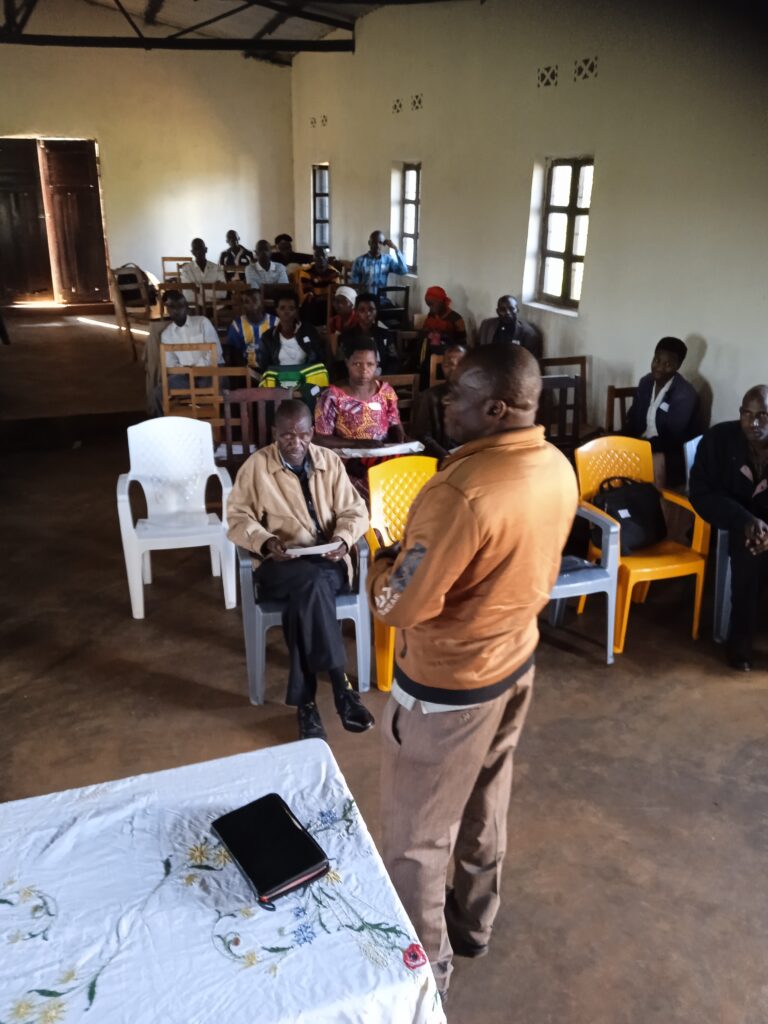
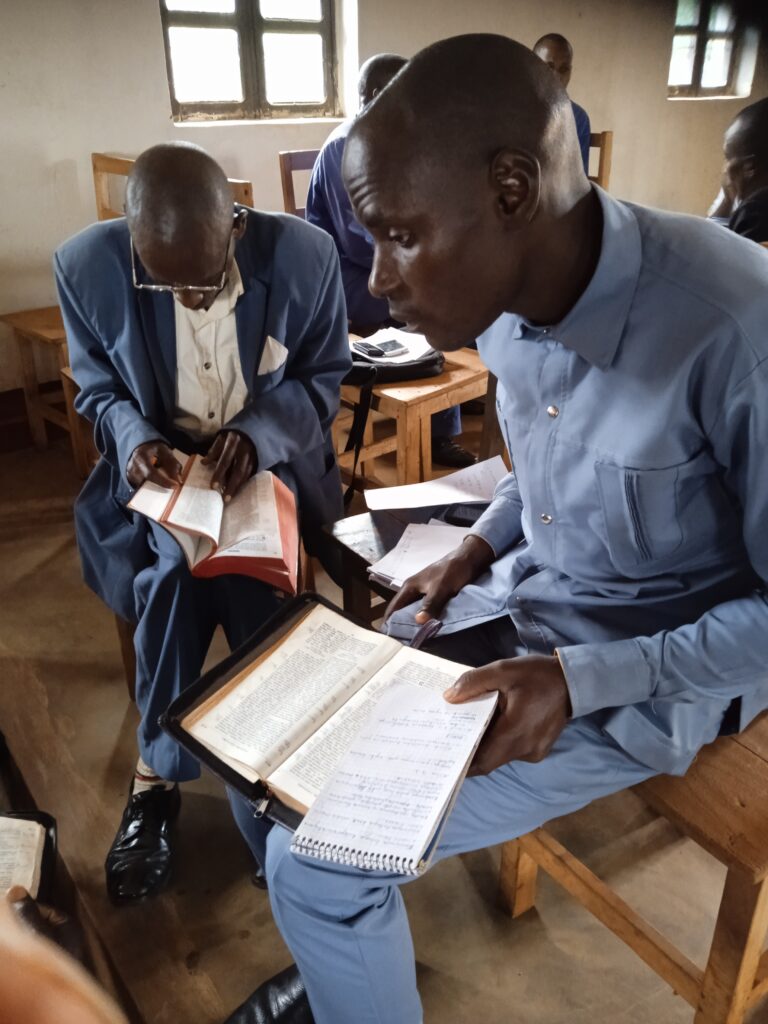
Friday 10th May
The days have taken on a fairly regular pattern – up around six, prayer and preparation, walk the half hour to the church where the training takes place, picking up a piece of bread from the baker on the way down, teach till 12.30, break for rice, beans, greens and a piece of meat, continue teaching till 4.30, back to the hotel, work out a bit in my room, pop out to a wee restaurant round the corner for more rice and beans, more prep, catch up with Izzy if there is power and internet at any time and off to sleep.
We’re onto Healing and Reconciliation now. The notes have arrived. At one point I ask for some personal feedback and get hit with a series of testimonies and queries on what to do when someone has killed members of your family. There are other issues to do with poisonings and whilst I stick faithfully to the Bible and the teaching, I can’t help but feel it’s easy to teach this and harder to live it out as those amazing people are doing.
Saturday 11th May
It’s a busy day today as we have a fair bit of teaching to get through plus two assessments and then an afternoon visit to the Batwa project as the training finishes at lunchtime to enable the pastors to reach home before their Sunday services. I start to talk about the need for personal healing of hurts and wounds. Pastors who minister with wounded hearts will often struggle emotionally to deal with the challenges, rejections and relationships of leading a church and can finish up wounding others. I talk through what Jesus did on the cross to bear our shame, pain and sorrow as well as our sin and there is a sense of God moving in hearts. We take time to seek God for healing, to forgive, to break off sinful consequential ways of behaving in response to hurt and many students experience a real touch of God. Some are clearly experiencing some deep healing. It seems a shame to draw things back for a final session and then the assessments but if the work done in hearts is real it’ll bear fruit anyway.
In the afternoon Gerard and I hop onto the back of a couple of moto taxis to make our way to the Batwa community a couple of miles down the hill from the town. We are met with singing and dancing and inspect the five cows. The cows had been bought especially for their manure, but when there were no fields to use the manure on the people had become a bit discouraged and lethargic about looking after them. Now there is land for planting there is a new energy and enthusiasm in the project. A crowd has gathered and I speak some words of encouragement before we walk across the hillside to the fields. The timing hasn’t been great as the fields were bought just after the previous planting so, although the fields now belong to the Batwa, the harvest to come will go to the previous owner. But the Batwa are very positive. It’ll be next February for their first harvest and noises are made about the need for hoes, seeds, a new cattle shed to house the cows near the fields and a watchman’s hut. Why did I think the project had been neatly set on track with no further input needed? The evening is back to prep for preaching tomorrow – it would be nice to have a set of take-away sermons with me but I find it hard to preach something that isn’t fresh or at least has a sense of rightness for that day so my prep for Sundays is often loaded towards the couple of days before.
There is a music competition going on as I turn in for the night. It sounds like a church is on an all-night prayer meeting and there are several ‘bars’ of various descriptions pumping out their Saturday night beats. At home a night-time noise like that would drive me crazy but it’s such a part of the background here I can cope.
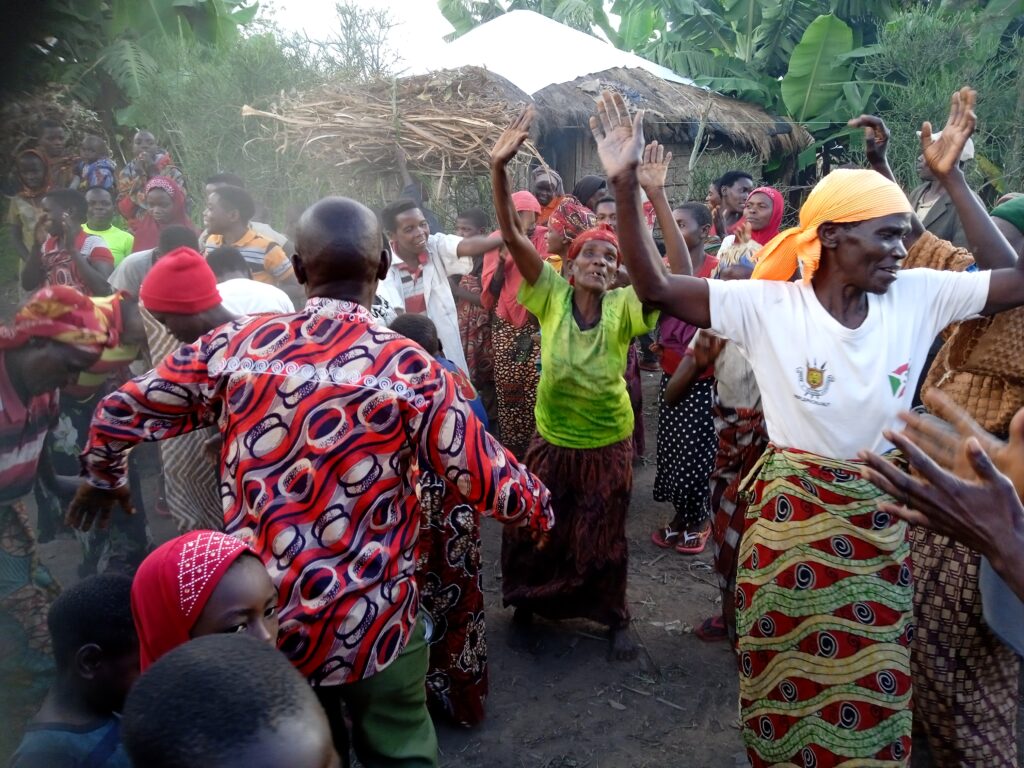
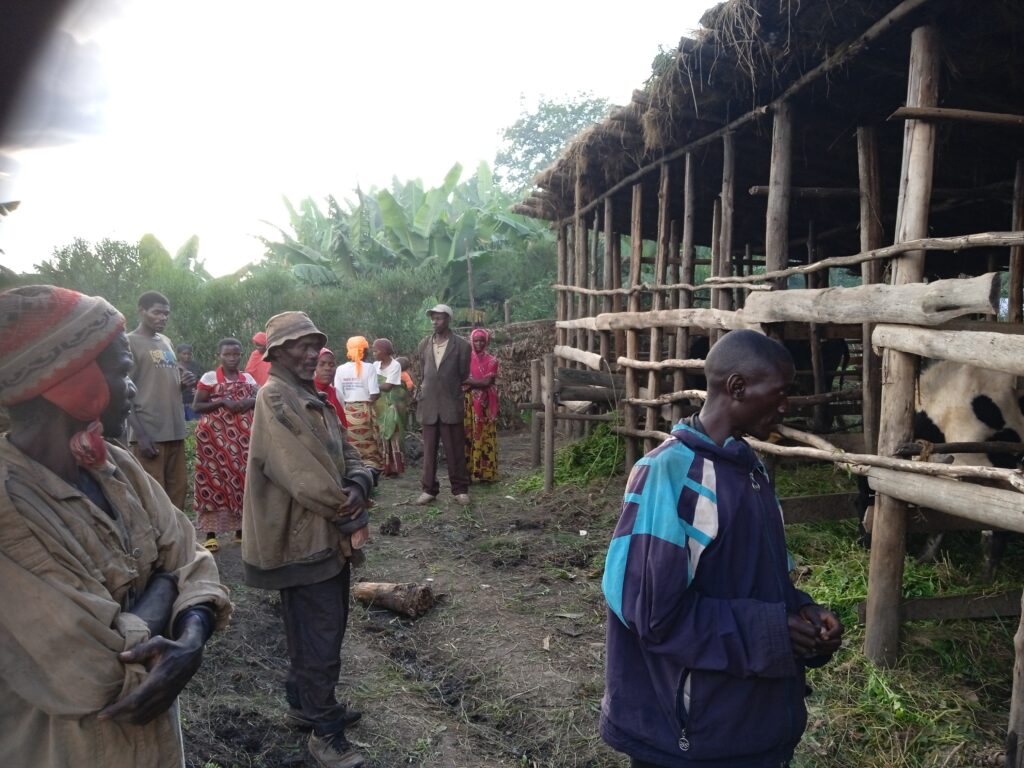
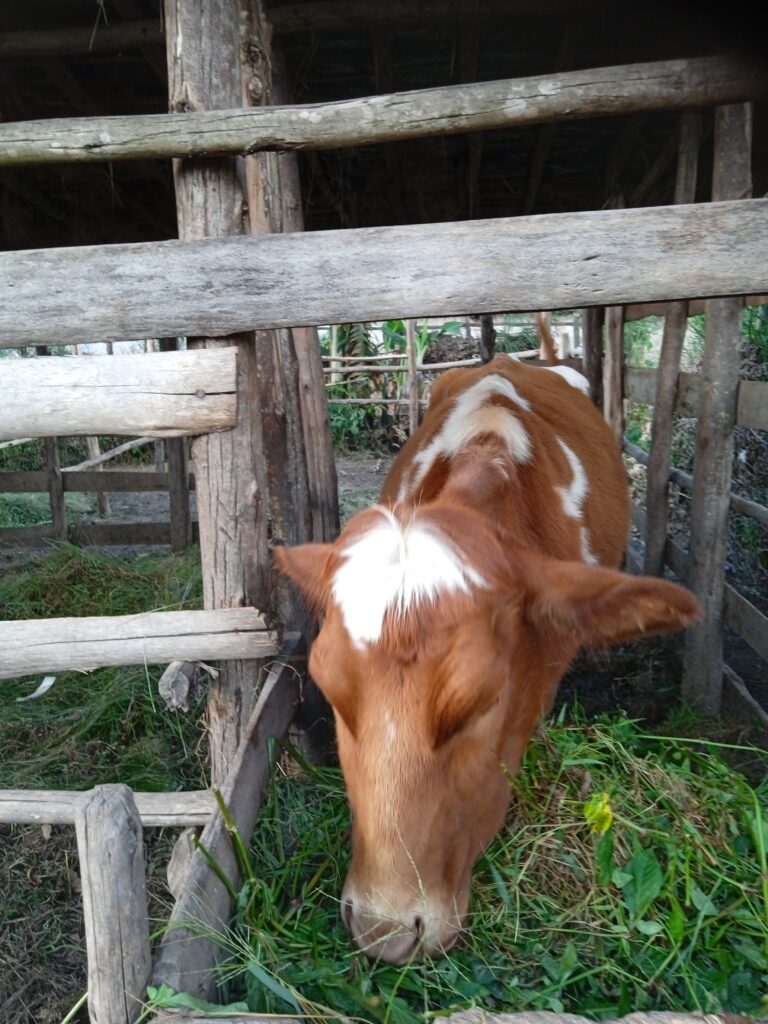
Sunday 12th May
It’s an early start to finish preparation and I speak at Gerard’s Elim Pentecostal Church on Colossians 1:9-11. Elim was deep in the veins of Izzy when we met – her parents and grandparents and great uncles were all involved in the early years of the Pentecostal movement and Elim in particular, so it’s good to be in an Elim church. I feel some special help from God as I preach and the people are with me as we work through an understanding of the ‘knowledge of His will’. Gerard is becoming a good friend and though I know preaching is far more than doing our best for a friend, I’m glad he feels some benefit for his church.
I’m hopeful we can make a reasonably quick exit and find some transport but an exploratory opening discussion about leaving for Rwanda discovers that food is being prepared. A couple of bananas would do as I am concerned we are underestimating journey times, but I should have known there is no way Gerard’s hospitality would have let me down now. He is consistently attentive and thoughtful.
By around 1.30 there is a Probox outside the church. Probox is described as a 4 seater Toyota car but our driver has not read the marketing and after some miles we are up to 11 passengers in the car. Gerard had suggested we hire a car to ourselves but I am pretty obsessive with not using charity money unless absolutely necessary – every pound spent on trip expenses is a pound less going to starving children in Congo or whatever other need is pressing in. And that’s not marketing but a very present reality.
We make steady progress, swap cars just over halfway to the Burundi-Tanzania border at Muyinga and continue towards the border. A couple of kilometres before the border the car stops and we transfer to motos which take us to immigration. A slow but incident-less procession through passport control ensues but there are no cars taking passengers on the other side. We ride on the back of motos for a while, find another car and make our way through Tanzania. It’s getting late now and if Gerard doesn’t start back he’ll miss the border crossing into Burundi which closes at 7pm. Reluctantly he hands me the hand luggage case he has insisted on carrying and bids me goodbye as I climb onto the back of a moto which carries me as far as the Rwanda border. I breathe a sigh of relief as I am comfortable travelling back through Rwanda even if it is getting late and another traveller who has been on the same journey through Burundi and Tanzania helps me find a seat in a truck going to Kigali. I’m calculating an 11pm arrival as traffic through Rwanda is much much slower than it has been in Burundi and Tanzania. The roads are peppered with speed cameras. The Rwandans call them all Sofia after the first AI robot to visit Rwanda but our truck has a transit number plate which is apparently immune to the fines and we sail along being kindly photographed by Sofia every few kilometres.
I call David Gasana to let him know I’ll be in Kigali by 10pm and I’m glad when he comes to pick me up. It’s been a long day.
